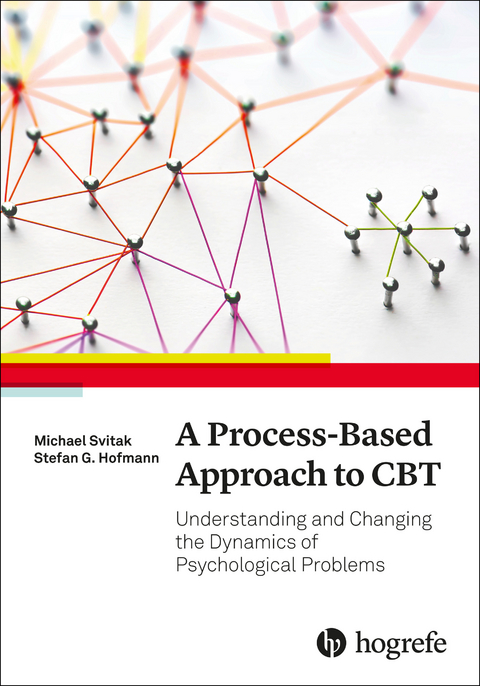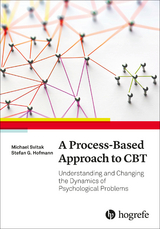A Process-Based Approach to CBT
Hogrefe Publishing (Verlag)
978-0-88937-628-1 (ISBN)
Using a process-based approach to personalize CBT for better successPresents a unique dynamic approach to CBTShows how to implement this approachProvides downloadable toolsThe process-based approach to cognitive-behavioral therapy (CBT) is a unique method for understanding psychological problems as complex networks of interacting processes. It allows therapists to grasp the individuality, complexity, and dynamics of psychological disorders - things that often get missed in diagnosis-oriented approaches. The authors, both experienced researchers and practitioners of this method, explore how understanding these complex networks enables therapists using CBT to focus on the core processes responsible for a person's suffering. First, the reader is shown how emotional, cognitive, behavioral, and somatic processes interact in maintaining maladaptive states and how this approach identifies the points at which therapeutic interventions can be applied to achieve maximum leverage. This is followed by guidance on implementing the approach in practice, including addressing diagnostic issues, to create an individual process-based model network for selecting the right evidence-based interventions. The process-based approach forms a connecting foundation that combines classical CBT with third-wave approaches (acceptance commitment therapy, schema therapy) and integrates helpful recent developments in psychotherapy research, such as evolutionary theories. Practitioners will find the downloadable tools in the appendix invaluable for their clinical practice. This book is of interest to clinical psychologists, psychiatrists, psychotherapists, mental health practitioners, students, and trainees.
Michael Svitak, PhD, studied psychology in Regensburg (Germany) and Reading (UK), receiving his doctorate at the University of Salzburg (Austria) in 1998. Since 2004, he has been head psychologist at the Center for Behavioral Medicine at the Schoen Clinic Bad Staffelstein and also a supervisor and trainer for process-based cognitive behavioral therapy.
Stefan G. Hofmann, PhD, is professor of psychology at the Department of Psychological and Brain Sciences at Boston University and has had tenure at Boston University since 2003. Since 2021, he has been Alexander von Humboldt Professor, LOEWE Top Professor, and Head of the Translational Clinical Psychology at Philipps University Marburg. His research and work interests are mechanisms of treatment change and emotion regulation, and cultural expressions of psychopathology.
Foreword
Preface
From the Symptom Level to the Process Level
Part I Theoretical Foundations
1 Limitations of Diagnosis-Oriented
Psychotherapy
1.1 Inadequate Conceptualization of Mental
Disorders
1.2 Complexity and Dynamics of Mental Disorders
1.3 Somatic or Latent Disease Model
1.4 Applying Linear Thinking to Complex Systems
1.5 Heterogeneity of Diagnoses
1.6 Nomothetic Versus Ideographic Explanatory
Models
2 Theoretical Foundations of Process-Based
Approach
2.1 Process Level: Space Between Narrative and
Diagnosis
2.2 Processes: The Origins of Behavior Therapy
2.3 Allostasis Model
2.4 Psychopathology: Complex Dynamic Networks
2.5 Psychotherapy
2.6 From Sick to Healthy
2.7 Typical Process Patterns Causing Psychopathology
and Suffering
2.8 Examples of Process-Based Disorder Models
3 Process-Based Models of Mental Disorders
3.1 Diathesis-Stress Model
3.2 Process-Based Diathesis Model
3.3 Process-Based Complex Network Model
4 Core Processes of Psychopathology
4.1 External Demands or Stressors
4.2 Vulnerability Mechanisms
4.3 Response Mechanisms
5 Psychotherapy From a Process-Based
Perspective
5.1 Core Processes of Psychotherapy
5.2 Process-Based Therapeutic Stance
5.3 Evaluation of Adaptivity Based on Evolutionary
Principles
Part II Applying the Process-Based Approach
in Practice
6 Phases of Process-Based Psychotherapy
Phase 1: Multidimensional Diagnostic of Relevant
Processes
Phase 2: Core Processes: Creating a Process-
Based Diathesis Model
Phase 3: Developing an Individual Process-Based
Complex Network Model
Phase 4: Defining Therapy Goals and Evaluating
Readiness for Change
Phase 5: Selecting and Implementing Interventions
Phase 6: Monitoring and Reevaluation of the
Perturbation Model
7 Phase 1: Multidimensional Diagnostics of
Relevant Processes
7.1 Spontaneously Reported Symptomatology
7.2 Specified Exploration of Conditional Factors at
the Process Level
7.3 Process-Oriented Functional Analyses
7.4 Longitudinal Analysis of Symptom Development
(Life Chart)
7.5 Treatment History
7.6 Including External Perspectives
7.7 Context Analysis
7.8 Process-Oriented Assessment of
Psychopathology
7.9 Using Traditional Diagnostic Methods to Identify
Relevant Processes
7.10 Further Process-Orientated Methods
8 Phase 2: Developing a Process-Based Diathesis
Model
9 Phase 3: Developing an Individual Process-
Based Complex Network Model
9.1 Practical Procedure for Developing a Complex
Network Model
9.2 Evaluating the Adaptivity of Network Patterns
Using the Extended Evolutionary Metamodel
9.3 Practical Example
10 Phase 4: Defining Therapy Goals and Creating
Readiness for Change
10.1 Defining Global Therapy Goals
10.2 Defining Targets of Change at a Process Level
10.3 Capturing Readiness for Change
11 Phase 5: Selecting and Implementing
Interventions
11.1 Selecting Interventions
11.2 Implementing Interventions
12 Phase 6: Monitoring Change and Constant
Reevaluation
12.1 Negative Versus Positively Oriented Monitors
12.2 Critical Thresholds and Bottlenecks in Therapy
12.3 Criteria for Ending Therapy
13 Outlook
Processes Instead of Methods
Toward General Psychotherapy
Process-Based Approaches as a Framework for
General Psychotherapy
Learning to "See" Processes
From Metaphor to Calculation
Eliminate Disorder-Specific Approaches?
| Erscheinungsdatum | 03.01.2024 |
|---|---|
| Verlagsort | Toronto |
| Sprache | englisch |
| Maße | 177 x 254 mm |
| Themenwelt | Geisteswissenschaften ► Psychologie ► Klinische Psychologie |
| Geisteswissenschaften ► Psychologie ► Persönlichkeitsstörungen | |
| Medizin / Pharmazie ► Medizinische Fachgebiete ► Psychiatrie / Psychotherapie | |
| Schlagworte | CBT • Cognitive Behavioral Therapy • network model • Process-based psychotherapy • Therapeutic Intervention |
| ISBN-10 | 0-88937-628-X / 088937628X |
| ISBN-13 | 978-0-88937-628-1 / 9780889376281 |
| Zustand | Neuware |
| Informationen gemäß Produktsicherheitsverordnung (GPSR) | |
| Haben Sie eine Frage zum Produkt? |
aus dem Bereich




